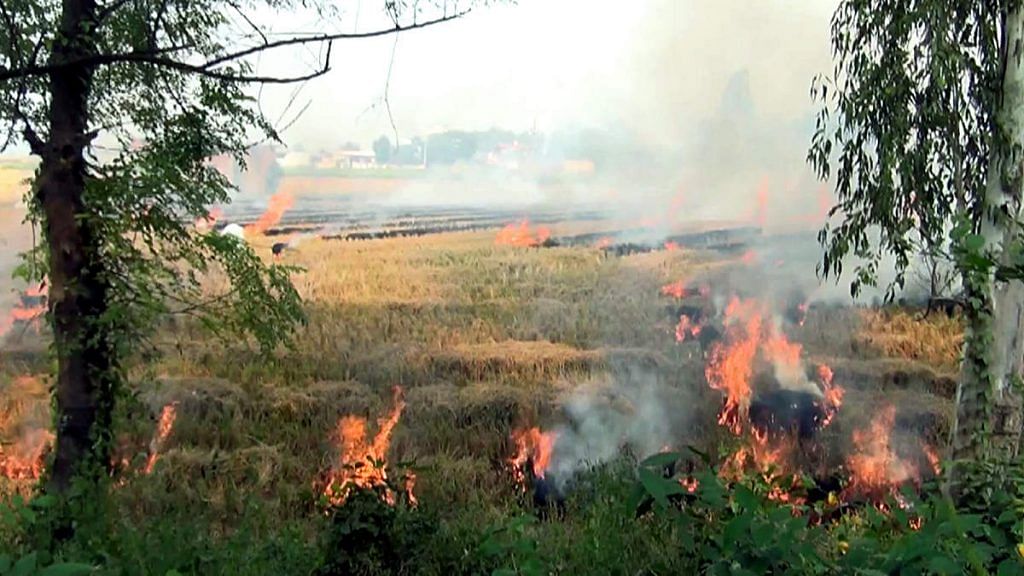New Delhi: Calls to control stubble burning in Punjab, Haryana and Uttar Pradesh have grown louder, but farmers in these three north Indian states have given a lukewarm response to a mobile app facility launched by the Narendra Modi government to assist in crop residue management.
Nearly two months ago, the Union Ministry of Agriculture launched the CHC Farm Machinery app to connect small and marginal farmers in these states to local custom hiring centres (CHCs) to avail agricultural machinery on a rental basis to manage stubble.
CHCs are privately-owned outlets offering farm machinery on hire. On an average, the minimum cost of hiring machines at these centres is around Rs 15,000-20,000.
As on 5 November, no farmer in Punjab and Haryana had avail machines via the government app. In Uttar Pradesh, farmers hired 11 machines against the 565 available ones, shows agriculture ministry data accessed by ThePrint.
In Punjab, 31 farmers put in requests to hire 55 machines available through the app. While 23 bookings were cancelled later, pending requests stood at 32 — total calculated against the machines, with one farmer opting for more than one machine, data shows.
In Haryana, 205 farmers requested hires against 322 machines. However, 135 bookings were cancelled later, with 187 requests pending as of 5 November. The number of farmers who requested hires in Uttar Pradesh stood at 377 — 234 bookings were cancelled and 320 requests remain pending.
No financial aid
Speaking to ThePrint about the poor response, an agriculture ministry official said, “The rate of lease along with transaction receipts are not decided on the app by the government. This often leads to arbitrary and high rates of lending being asked by the CHC because of which farmers are reluctant to avail the machines through app.”
The app only offers easy access to machines at these centres, and doesn’t provide financial assistance.
Happy seeder, reversible plough and paddy straw mulcher are among the machines available at the CHCs via the app. These help farmers in managing stubble through technology, eliminating the need to burn it.
Stubble burning is among major pollutants in north India causing toxic air pollution across states. Earlier this week, the Supreme Court ordered incentives of Rs 100 per quintal for small and marginal farmers in these three states to compensate for stubble management.
Also read: North India’s toxic air: NASA images show just how big the stubble burning problem is
High cost and rains
Blaming the low number of hires via the CFC Farm Machinery app on high cost of machines, a second senior agriculture ministry official told ThePrint, “As of now, the total cost of Happy Seeder is about Rs 1.3 lakh with a subsidy of 33 per cent. This leads to a lending rate of about Rs 20,000 a week as it only has a seasonal requirement.”
The official added, “We have asked the states to impart some subsidy so that the total subsidy could be raised to 50 per cent which will then translate on much cheaper lending rates for farmers against the existing stubble burning method.”
Paramjeet Singh, proprietor of farm machinery manufacturer Star Agrotech, however, blamed excess and untimely rains for poor adoption of farm machines this year.
“Due to heavy and untimely rains, stubble has a higher moisture content this year which leads to low amount of straw through the machines which is to be consumed by livestock, hence the farmers are reluctant to buy or lease it,” said Singh.
When stubble is chopped down by happy seeder machine, it is converted into straw which is then used as raw material in fodder of animals reared by farmers. If there is extra moisture content in stubble, it doesn’t get cut into fine-sized straw.
“Last year, I sold 63,000 units machines. This year, only 17,000 have been sold so far,” he said.
“The CHC owners try to extract the maximum amount of their machines by their initial lending of machines,” Jagpreet Singh, a farmer with a landholding of 3 hectares in Punjab’s Mansa district, told ThePrint.
“This increases the rate of machines up to Rs 15,000-20,000 a week which is not viable for small and marginal farmers.”
How CHCs are run
The rates for hiring machines are decided by a gram sabha-nominated committee, which manages the Custom Hiring Centres (CHCs). The panel also uses the revenue generated for maintenance of the machines.
These CHCs can be owned by farmers as self-help groups, or cooperative societies, or farmers registered as entrepreneurs.
Haryana has 1,725 CHCs — 418 owned by farmers, 1,303 by societies and 4 by entrepreneurs. In Punjab, the corresponding figures stand at 2,108 — 518, 1,585 and 5. Uttar Pradesh has 2,559 centres — with respective figures of 2,000, 524 and 35.
Apart from the app, the agriculture ministry also runs a central scheme to combat air pollution and subsidise machinery required for in situ management of crop residue through farm mechanisation. The scheme has an allocation of Rs 1,151.80 crore for 2019-20.
Also read: Band-Aids on stubble burning pollution won’t do. India must tackle it as food security issue
